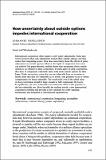| dc.description.abstract |
International cooperation often requires costly policy adjustments. States may worry, however, that such adjustments weaken their outside options, and thus reduce their bargaining power. How does uncertainty about the effects of policy adjustments on outside options influence the depth of cooperation that states can achieve? My game-theoretic analysis shows that uncertainty about outside options is an obstacle to deep cooperation. If states agree on deep cooperation, they have to compensate vulnerable states with weak outside options for their losses. Under uncertainty, states that are not vulnerable have an incentive to falsely claim that they are vulnerable (i) to avoid a side payment or (ii) to obtain compensation for being vulnerable. The result holds even if the added value of deep cooperation would be large enough to fully compensate the losers. In equilibrium, the more vulnerable state sometimes offers a side payment to the less vulnerable one. More broadly, the analysis reveals a new international cooperation problem and provides a new rationale for costly signaling mechanisms and delegation to international organizations. |

